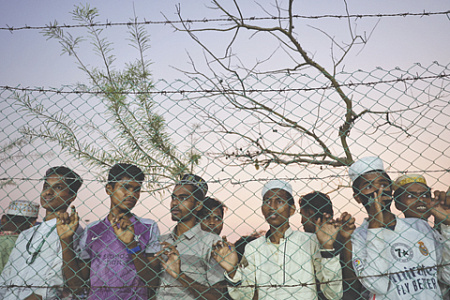
According to the UN Refugee Agency, in May, 427 Rohingya who tried to escape persecution in Myanmar (Burma) in Bangladesh on ships could have drowned. The agency interviewed the relatives of the victims. Conclusion: in May, two ships went down.
The majority of Rohingya are Muslims. This has largely predetermined the conflict in a country where the majority of the population are Buddhists. The Rohingya do not have Myanmar citizenship, and they are viewed as illegal immigrants. About 10 years ago, militant groups appeared in this ethnic group, which began to attack border guards and police officers. In response, the army launched a campaign of brutal repression against the Rohingya. They began to cross the border and take refuge in Bangladesh. According to the AP news agency, there are more than 1 million Rohingya there.
In an interview with NG, Dmitry Mosyakov, head of the Southeast Asia Department at the Institute of Oriental Studies of the Russian Academy of Sciences, noted: “The situation in Myanmar is difficult. In the area where the Rohingya live, there was an attempt to rebel and achieve the creation of an independent State. This happened in the second decade of this century. Islamic radicals have infiltrated the Rohingya area. They attacked border guards and police posts. It was an attempt to separate the region from Myanmar. The rebellion was suppressed by bloody methods. Prior to these events, the authorities tolerated the Rohingya, even allocating them plots of land. But after the attempted uprising, the attitude towards them became tougher, in particular, from another community living in the same area. The Rohingya are not trusted, they are oppressed. This is a tragic situation.”
The UN Refugee Agency pointed out that not all the details of the tragic incidents are clear. But interviewing relatives of the victims and other people allows us to inform the world about what happened. And the background of the events is as follows. Of the more than 1 million Rohingya in Bangladesh, approximately 740,000 took refuge there, fleeing the purges of the Myanmar army in 2017.
But let’s return to the current events. The first vessel, which can more accurately be called a large boat, transported a new batch of migrants from Myanmar to Bangladesh on May 9. It went down the same day. Of the 267 people on board, only 66 escaped. And later it became known about the second such case. This time, 21 people out of 247 on board were rescued.
Babar Baluch, a representative of the agency, explained that another 30 Rohingya drowned or disappeared while being transported by sea. Previously, according to the UN, thousands of people tried to cross the Bay of Bengal or the Andaman Sea every year. Many have gone missing. There have been cases when the signals of those in distress have become known to officials in charge of navigation. But the officials ignored them. The monsoon season is aggravating the situation. It brought strong winds, rains and storms at sea. Refugees are primarily a humanitarian problem. But it affects geopolitics. Not only that, Bangladesh willy-nilly took over the hosting of refugees from neighboring Myanmar. The political situation inside Bangladesh has become extremely complicated. When Prime Minister Sheikh Hasina, the daughter of Mujibur Rahman, the founding father of the republic, who was killed by the conspirators, was overthrown in August last year as a result of student riots, the Western press admired the victory of democracy over authoritarianism. An interim government was created, headed by Muhammad Yunus, who was awarded the Nobel Prize for creating a tool for cheap lending to the poor. Sheikh Hasina, fleeing from the angry crowd, flew to India with her closest associates.
It was announced that elections would be held and a government with the support of voters would be established. However, the new government failed to restore law and order. Islamist militants began attacking temples of Hindus, a religious minority in the republic. Arson attacks and looting of the houses of officials who ruled under Sheikh Hasina were carried out. The authorities, as usual in such cases, blamed the former ruling Awami League party. She was outlawed. But the riots and demonstrations have not stopped. At that moment, the head of the interim government, Yunus, said that the cabinet could resign. The adviser to his cabinet says that it is impossible to leave in any case.
According to The New York Times, much depends on the army. The army did not stand up for the previous government. It is unknown whether she will save the current government. After all, it is impossible to establish peace without the use of force.
There is an external player who can influence the situation. This is India. Under the government of Sheikh Hasina, relations between India and Bangladesh were almost allied. It is not clear from the statements of its diplomats how Delhi will act today. In any case, it is obvious that South Asia is not the most stable region on the planet.
